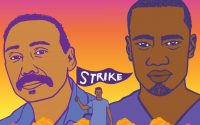Portugal // A fight to save the Sado river in Setubal~ 3 min
By Duarte Guerreiro and Simone Vieira
Popular movements, environmentalist associations and citizens joined together yesterday at Fisherman’s Wharf, in Setubal, gathering for a demonstration that ended at the headquarters of the Port Administration of Setubal and Sesimbra (APSS).
The cause for this demonstration – a fight ongoing since 2017 – is a “Maritime Accessibility Improvement Project for the Port of Setubal”, by the APSS. It would mean carrying out dredging works that would put the final nail in the coffin of the local ecosystem, including the local dolphin population, by devastating the basis of the food chain. Fishing, still an important activity for many in the region, would also suffer greatly.
Another deal between the private sector and the central state that waves the flag of public interest in order to justify economic development.
The process
It began in 2016. The company went ahead and submitted its investment project to the State; the State was smitten and the request for a Single Environmental Title (a license) moved ahead. Arguments such as the proximity to Lisbon, Madrid and the entry into the Mediterranean were determinant. All so that the port might receive larger vessels, ever larger.
In 2017, APSS received a conditionally favorable Environmental Impact Declaration (DIA). According to data from the entity responsible for emitting the DIA, the Portuguese Environmental Agency, only 10% of the licensing requests are refused.
With the Single Environmental Title in its hands, the company moved forward with another licensing request to allow it to use the maritime space it requires to deposit dredged material – a title for private use of the national maritime space (TUPEM). One more opaque bureaucratic administrative process that sidelines the local communities.
Ana Jorge from SOS Sado told us that the Portuguese Environmental Agency (APA) refers in its decision that, “despite the existence of a series of negative impacts for the environment, they are balanced out by the positive impacts present in the economic study”. An economic study confirmed not to exist by the APA itself, concludes Ana Jorge. This is just one more incident among the thousand that SOS Sado has been dealing with throughout the years the process has been going on.
The SOS Sado movement has also been accompanying and compiling information about this project. Documents go missing and the lack of transparency is constant. There have been many complaints presented by this movement, with most going unanswered.
This is just another case, similar to other processes all over the territory, where local communities have organized and struggled to access information. They want their voices heard in a legal procedure that calls itself democratic but which ignores them.
For the moment, and considering the lack of means, the plan is to keep alert and act as soon as the dredging works begin at the Sado river.




